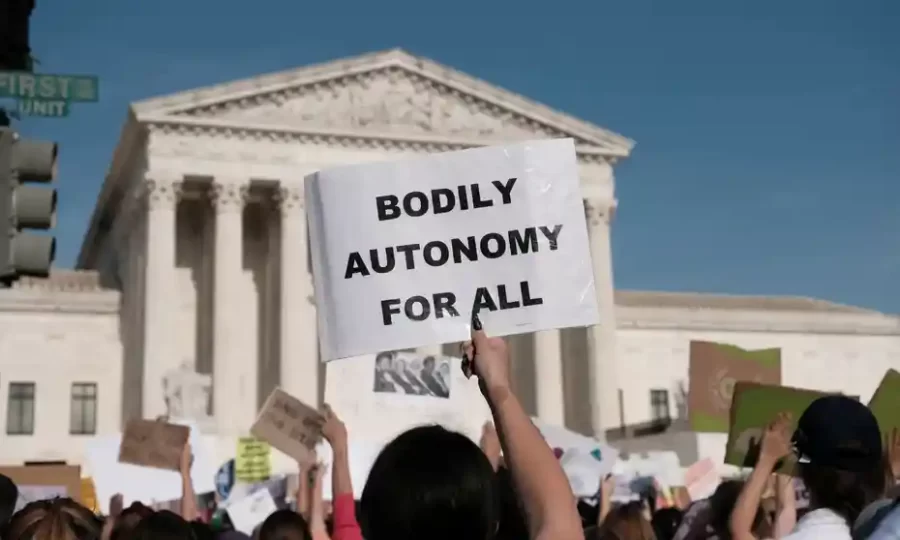Roe Decision Threatens Women, Judicial Legitimacy
Protests broke out outside the U.S. Supreme Court building within minutes of the landmark decision.
June 24, 2022
As of this morning, the landmark Roe v. Wade and Planned Parenthood v. Casey rulings were overturned by the U.S. Supreme Court, with the majority opinion written by Justice Samuel Alito. This decision reverses nearly 50 years of precedent protecting abortion as a right.
The same is true today as was on May 2, when Alito’s leaked draft majority opinion was published by Politico, and as was on January 22, 1973, when SCOTUS issued the initial 7-2 Roe v. Wade decision.
The right to choose is a crucial issue of personal privacy, liberty and healthcare for American women, and restricting it is an affront to their bodily autonomy and access to opportunity.
The unequal effects of abortion bans cannot be overstated. They exclusively burden, disenfranchise and endanger women. More than that, though, this move disproportionately impacts lower-income women and women of color, especially those living in states that will make abortion completely inaccessible.
In Texas, the state in which the Roe case was first filed, this decision’s impact will be nearly immediate. Texas is one of 13 states with so-called “trigger” bans in place, designed to take effect within 30 days of Roe being overturned. Nearly half of the 50 states are also likely to fully or substantially ban abortions in the coming months.
The researched and proven results of anti-abortion legislation are unmistakable. These laws will increase unsafe “back-alley” abortions. However, once again, this dangerous consequence will not be the same for all women. Those with the means to do so will be able to travel to states that provide legal, safe abortions, while women without that luxury will suffer.
A 2021 Duke University study found that banning abortion in the United States would lead to a dangerous increase in pregnancy-related deaths simply as a result of forcing women who would otherwise seek abortions to carry pregnancies to term. The study estimated a 21% surge in pregnancy-related deaths overall, with an even greater 33% increase for African American women.
The decision also disregards the will of the American people. In research conducted just this year, the Pew Research Center, a nonpartisan think tank, found that 61% of Americans think that abortion should be legal in all or most cases.
The effects of this ruling stretch far beyond abortion rights. It signals an end to the sanctity of standing precedent and consequently the legitimacy of the highest court in the land. The doctrine of stare decisis, which has long guided judicial proceedings in the United States, states that courts must stand by existing rulings when approaching new cases.
Along with his peers in the concurring opinion, Justice Alito previously championed stare decisis, calling it a “fundamental part of our legal system” that “reflects the view that courts should respect the judgments and the wisdom that are embodied in prior judicial decisions” in the 2006 Senate hearings that confirmed his Supreme Court appointment.
This remarkable break from American legal tradition and doctrine debilitatingly damages the role of the court as the sole branch of the federal government ideally free from complete partisanship and allows any number of other previous historic rulings to be called into question and overturned.
This concern is not hypothetical. In a separately published concurring opinion, Justice Clarence Thomas called for similar action on three other key civil liberty rulings.
“In future cases, we should reconsider all of this Court’s substantive due process precedents, including Griswold, Lawrence and Obergefell,” Thomas wrote.
The cases mentioned protect the rights to contraception, LGBT+ sex and same-sex marriage, respectively. Arguing that Thomas’s call was motivated by anything other than personal politics is laughable.
Today, five justices chose partisanship over constitutionality, over legal precedent and over the health and safety of millions of Americans. By overturning Roe v. Wade and Planned Parenthood v. Casey, the Supreme Court has endangered enumerable women across the country and the sanctity of the American judiciary, opening a dangerous door that may be difficult to close.
Further Reading:
Pew Research Report:
https://www.pewresearch.org/religion/fact-sheet/public-opinion-on-abortion/
More information:
https://www.guttmacher.org/sites/default/files/report_pdf/abortion-worldwide-2017.pdf











